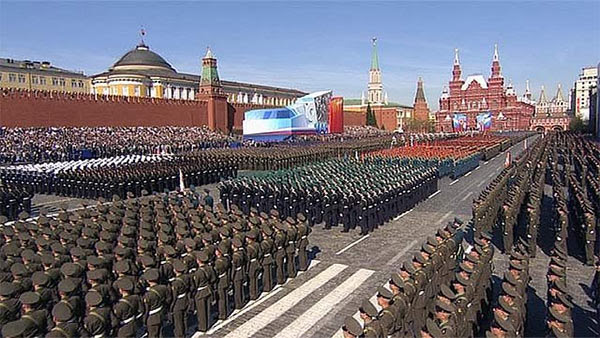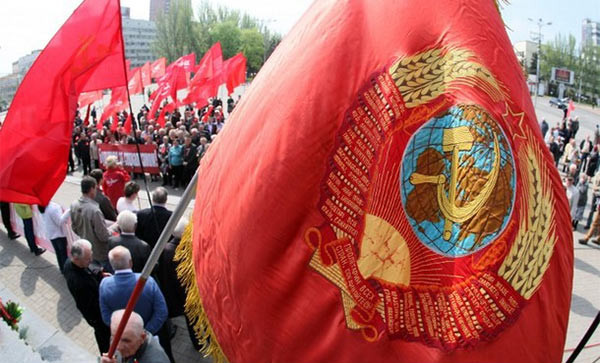Why did the Ukraine parliament outlaw Communism and Nazism?
On April 9th, after a 24-year delay, the Ukrainian parliament (Rada) has passed a legislation banning communist propaganda along with its symbols, from street names and flags, to monuments and plaques.
The new legislation, passed by 56% of parliamentarians, declares the communist government that ruled Ukraine during the Soviet era a criminal regime that conducted policies of state terror. The ban similarly extends to Nazi propaganda and symbols, even though unlike Communism, Nazism has hardly had any following in a country that was hit hard during WWII and the Nazi occupation.
With urgent and serious problems facing Ukraine’s economy, finances, government reform, and a war with Russia-backed separatists, what was the sudden rush to condemn Nazism and communism simultaneously, given that Nazi Germany and the USSR had collapsed in 1945 and 1991 respectively?
On the surface, bundling together these two antihuman, totalitarian ideologies may seem like a symbolic gesture, but in reality each of them was banned for a very different practical reason, both of them of an existential nature.
Communism 2.0: Russians of the world, unite!
Since the beginning of Ukrainian independence, local communists have remained loyal to Moscow, doing the bidding of the political forces in Russia that sought the restoration of the totalitarian Soviet empire. Protected by the constitution, communist demagoguery has worked as a busy conduit for the Kremlin’s anti-Ukrainian and anti-Western imperial agenda.
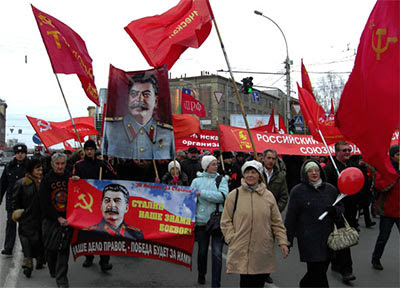
The pro-Russian separatists in the self-proclaimed “People’s Republics” of Donetsk and Luhansk are also driven by a similar imperial agenda they call Russkiy Mir (Pax Russiana), rallying under old Soviet flags, with portraits of Lenin and Stalin in their hands.
Those in the Crimea who cheered Russia’s military takeover of their peninsula were similarly nostalgic of the old USSR and the rule of Stalin’s strong hand; they welcomed Russian troops by carrying red flags, portraits of Soviet leaders, and other communist paraphernalia.
Russia’s state-run media cleverly conflates Soviet nostalgia with being Russian or being part of Pax Russiana. This sentiment, fully supported by Ukrainian communists, was effectively used to start a war that has killed more than 6,000 people since April last year and is still simmering in the eastern regions of Ukraine.
Under these circumstances, a ban on communist propaganda and the condemnation of the USSR as a criminal totalitarian regime serves a very concrete purpose of protecting the nation’s sovereignty and independence at a time of war. In this sense, it functions as a Treason and Sedition Act aimed to disable the Fifth Column which is aiding the foreign enemy from within.
Grassroots de-communization
Most Eastern Bloc and some post-Soviet nations marked their independence with policies of de-communization, cleansing their governments of corrupt officials and dismantling the communist legacies in their cultures and psychology. This worked much to their advantage, strengthening their democratic institutions, transparency, international standing, and ultimately their economies.
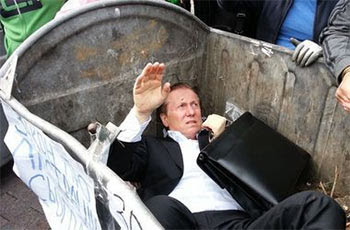
That had never happened in Ukraine, let alone Russia. Though de jure an independent nation, Ukraine continued to vegetate in Russia’s shadow, instructed by Russia’s media, and manipulated by Russia’s elites who were interested in keeping Ukraine vulnerable, dependent, and corrupt.
Today’s messy developments in Ukraine are largely the result of belated attempts by this vulnerable, dependent, and corrupt nation to right itself and clean up its act under incessant attacks from behind the fence by the drunken abusive ex who thinks nothing of violating restraining orders and believes he has a sacred right to do so.
Last year, tired of waiting for the government to act, grassroots activists throughout Ukraine undertook a self-styled, anarchic effort at de-communization by throwing corrupt, pro-communist politicians into large garbage bins and posting these videos online.
Their bottled-up, spontaneous outburst also resulted in a massive unauthorized demolition of Lenin monuments all over Ukraine. That only threw more fuel on the smoldering separatist sentiment among the pro-Russian minority in Ukraine, as well as on the already blazing nationalism among a powerful majority in Russia, for whom attacks on communist symbols are no different from attacks against Russia itself.
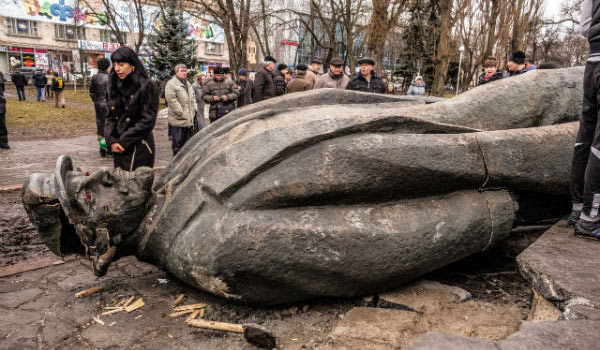
In the end, communist movements in Ukraine and other Eastern European nations aren’t as much about the Marxist theory as they are about the return of Russia’s domineering role in the region. With the inevitability of a speeding freight train, a restoration of Russia’s dominance will also bring back economic, cultural, and political subjugation, Russification, brain drain, persecution of local nationalism and the implied status of inferior people for all non-Russians.
The fascists of today are called anti-fascists
Kiev’s official condemnation of Nazism serves a very different purpose: it aims to undercut Russia’s grotesquely surreal canard that describes last year’s Maidan Revolution in Kiev as a U.S.-backed fascist coup d’état. Repeated over and over, the Russian media’s portrayal of Ukrainians as Nazis has gone a long way to pit ethnic Russians against the formerly brotherly nation.
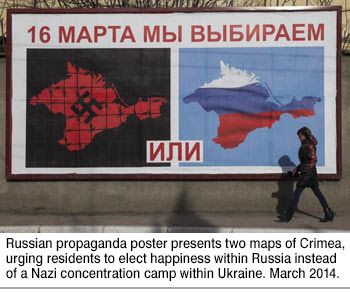
In addition to conflating communism with Russian chauvinism, the Kremlin’s propaganda is also effectively using the old Soviet trick of conflating everything that opposes the will of the Kremlin with fascism and Nazism: “Communist Russia has defeated Nazism, therefore anyone who opposes communism or Russia must be a Nazi.”
This obvious logical folly would be laughable if it didn’t continue to shape the minds of many in Russia and beyond, even despite the fact that Russia’s own policies of land grab and national chauvinism almost exactly follow those of Nazi Germany in the years leading to WWII.
Trumped up with the reanimated “Great Patriotic War” rhetoric, the Kremlin’s Goebbels-like propaganda is inspiring thousands of Russian volunteers to cross the border and shoot at imaginary fascists in eastern Ukraine, proving Winston Churchill’s prophetic insight: “The fascists of the future will be called anti-fascists.”
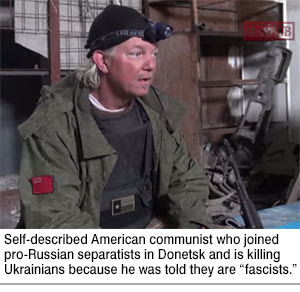
The effects of this mind game aren’t limited to Russia alone. This video, taken recently in Donetsk, shows a self-described American communist (pictured on the left) who volunteered to join the Russian nationalists and kill Ukrainians within the belief that he was being an “anti-fascist.” Like an “A” student during a school test, he diligently recites all the Kremlin-generated talking points: the Ukrainians are Nazis, the fascist coup in Kiev was instigated by the imperialist United States, the war is part of America’s anti-Russian strategy, and other memes he has likely picked up from the English-language RT and similar propaganda channels and websites. Described in the video as a “Texan” but sounding more like a Californian surfer dude, he promises to keep fighting until a complete and unconditional surrender of all fascists (or until he runs out of that stuff he’s smoking, whichever comes first).
In contrast, this Russian-speaking volunteer from Kirghizstan, who had been also been misled by the propaganda on Russian television and arrived in eastern Ukraine on a moral quest to fight “fascists,” eventually became disillusioned and returned home, accompanying the sealed coffins of two fellow Kyrgyz soldiers. “I thought that there were fascists there,” he says in an interview to Radio Liberty, “but I didn’t see any. We fought against the regular Ukrainian Army.” Unlike the English-speaking “Texan” above, he was able to communicate with local residents and captive Ukrainian soldiers. “It turned out that everything was agitation, propaganda,” he concludes. “This was really offensive to me.”
Why now?
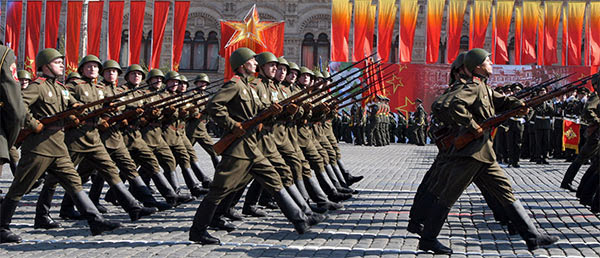
On May 9th Russia is going to celebrate Victory Day: the 70th anniversary of the surrender of Nazi Germany to allied forces in World War II (the official Russians term for it is the “Great Patriotic War,” which lasted from June 22, 1941 to May 9, 1945).
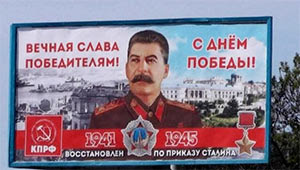
Every Russian government starting with Stalin has habitually attributed all credit for the victory to itself and sometimes to the “unbreakable friendship of Soviet nations united under Russia and guided by the Communist Party and personally by Comrade Stalin.” Faithful to the tradition of utilizing Victory Day as a vehicle for a self-serving political agenda, Russia’s state-run media has already begun to whip up jingoistic fervor in the run-up to the holiday, using victory over Nazism as a launching site for spectacular anti-Ukrainian fireworks.
This year’s Victory Day was meant to be especially bombastic. Every more or less significant world leader had been invited to attend the military parade on Red Square. They were expected to stand side by side with Vladimir Putin, thus reaffirming the Russian (and, by extension, Soviet) military’s leading role in the “struggle for peace,” which would validate Russia’s current policies and show everyone who’s boss.

Putin has once boasted in an interview that, as a chess player, he never makes a political move without calculating several steps ahead. The conflict in Ukraine and the annexation of the Crimea, however, has been nothing but a series of fundamental miscalculations. As a result, all serious heads of state have declined his invitations. The “group of international leaders” on the podium will likely be limited to Third World miscreants hoping to get on Putin’s good side in order to score cheaper oil, weapons, or nuclear technology. The biggest international celebrity will undoubtedly be North Korea’s dictator Kim Jong Un, who has officially confirmed his appearance.
Until now Ukraine had been slavishly following Russia’s lead in perpetuating Stalinist mythology of the “Great Patriotic War” – a trend jealously enforced by Russia as a symbol of Moscow’s continued sway over the neighboring post-Soviet states. But another new law, adopted in Kiev along with the ban on communist and Nazi propaganda, has broken the old pattern.
From now on, Ukraine will join the rest of the world in marking the end of the war on May 8th, as the Day of Remembrance and Reconciliation for Those Who Lost Their Lives during World War II, in 1939-1945. After all, the war came to the western part of Ukraine two years before it came to Russia, after the 1939 Nazi-Soviet pact started WWII by splitting Poland in half. What transpired in Ukraine wholly contradicts Russia’s “Great Patriotic War” narrative.
The Nazi smear
The Red Army invasion into well-off western Ukraine (then part of Poland) in September of 1939 brought repressions and deportations, provoking armed resistance on the part of Ukrainian patriots. Upon the advance of the German army in 1941, nationalist groups organized into the Ukrainian Insurgent Army (UPA), which fought against the Third Reich throughout the Nazi occupation. After the return of the Red Army in 1944 they continued to fight a losing battle against the communists in western Ukraine all the way through the mid-1950s. The Stalinist regime self-servingly described these anti-communist freedom fighters as Nazis – a myth in which most Ukrainians were later forced to believe under the threat of imprisonment, and which is still thoroughly cultivated in Russia.
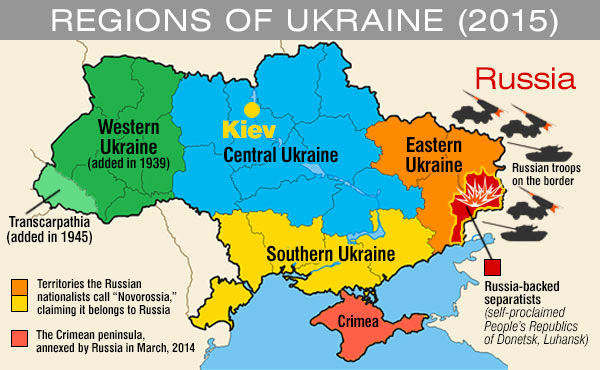
Today many in Ukraine feel that the UPA fighters must be recognized and remembered along with other WWII heroes and victims. This notion is still being fiercely rejected by most Russians and those Soviet-era Ukrainians who can’t part with the Soviet mythology, believing that the UPA were Nazi collaborators.
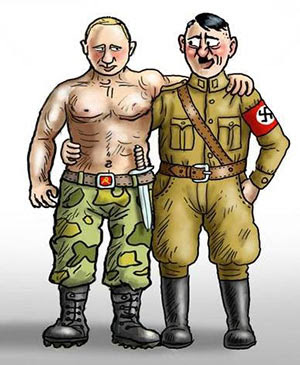
The Nazi smear allowed the Soviet communists to keep Ukrainian nationalism in check until the day the USSR collapsed. But Russian state-run TV channels, which continued to be available throughout Ukraine, persisted with the Nazi smear even after the independence, effectively influencing Ukrainian voters in every election cycle by painting pro-Western politicians as neo-Nazis and promoting Moscow-backed politicians, one of whom was the ousted president Viktor Yanukovych.
Thus, Russia’s current allegation that the 2014 revolution in Ukraine was a Nazi coup orchestrated by the CIA and the U.S. State Department is not a new invention, but merely a modern-day remake of the hoary propagandistic myth started 70 years ago by Stalin.
Accordingly, Ukrainian parliament’s official condemnation of Nazism was clearly an attempt to put that damaging Stalinist narrative to rest.
In an effort to replace the old Soviet symbolism with a new one, on April 7th Ukraine’s First Lady Maryna Poroshenko attended a “Remembrance Poppy” event marking the anniversary of the Nazi surrender.
Since many older people may still want to follow the old Victory Day tradition on May 9th, the holiday will remain, but the phrase “the Great Patriotic War” will now be replaced by “World War II.” Given that most Red Army veterans in Ukraine will likely parade with their Soviet medals in violation of the ban on communist symbols, enforcing the new law may put the government in an uncomfortable position. Perhaps the police will be advised to turn a blind eye; we’ll have to wait and see.
As part of Russia’s angry response to this legislation, its Foreign Ministry representative Konstantin Dolgov, endowed with an Orwellian title “Commissioner for Human Rights, Democracy, and the Rule of Law,” called Ukraine’s ban on communist ideology a “cynical move,” which violates international obligations by depriving many of its citizens their legal rights. The E.U. and the U.S. should no longer ignore this,” he wrote on his Twitter blog. The diplomat ended his statement on a surreal note, saying that a law that equates communism and Nazism somehow “reveals Kiev’s depraved unwillingness to break with the neo-Nazis.”
The Russian social media’s reaction is a lot more vocal but a lot less quotable. In the minds of pro-Putin patriots, the world outside of Russia’s borders is populated entirely by virulent Russophobes whose only purpose in life is to hurt Russia out of sheer hatred for Russia’s big heart and spirituality. But, like a broken clock that shows the correct hour twice daily, this time they get it right: Ukraine’s ban on both communist and Nazi propaganda is directed, quite deservedly, against Russia with its Orwellian policies.
